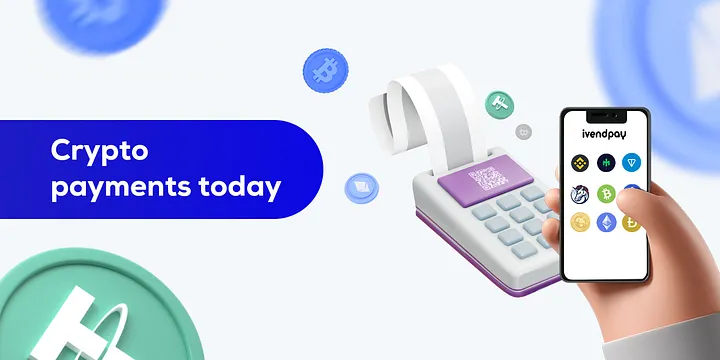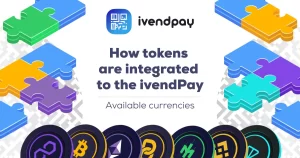There are about 300 million people in the world right now who own cryptocurrencies. Most of them are energetic entrepreneurs who travel a lot, buy a lot and follow the news closely. In the last 7 months, the value of digital assets they own has fallen from $3 trillion (November 2021) to $900 billion (June 2022) as the cryptocurrency market is highly volatile. But this has happened to the market before.
What to do with an asset that is falling in value right now during the “cryptocurrency crisis”? It is logical to exchange it for fiat currency or for goods, that is, to make a purchase for cryptocurrency. So cryptocurrency owners should have a simple opportunity to pay by it for goods, and merchants should have an understandable to them way to accept such payment.
Theoretically, such transaction could take place if both the buyer and seller have cryptocurrency wallets and they themselves can complete transactions quickly and accurately. But most sellers in retail are very far from the cryptocurrency industry — they are much closer to having to pay taxes, staff salaries and organise accounting work.
What is the problem and why is there a need for a bridge between retail and cryptocurrencies?
Bottom line: the seller’s problem is how to legally and technically easily get the cryptocurrency into their account; the buyer’s problem is how to pay with cryptocurrencies without having to withdraw them from a custodial wallet and pay a hefty conversion fee to fiat.
The solution to this problem is offered by various payment systems that combine the functions of a processing (technical support for payment) and a payment gateway (conversion of cryptocurrency into fiat to be credited to the merchant’s account). But look at these solutions carefully: Binance pay, CoinPayments, Coinbase, CoinsBank, BitPay, Shopify Gateway and others are apps for an advanced audience that well understands cryptocurrencies and computers. Ask any seller at your nearest shop if they will accept Dash payments via SpectroCoin, and post in the comments what they tell you — will smile together. Also, most payment systems prefer to work with dollars and bitcoins, despite not the fastest transactions and fees.
Clearly, there needs to be a next-level technical solution that ‘builds a bridge’ between retailers and digital asset owners. One such solution is a POS terminal that can accept both fiat currencies and digital assets on blockchain.
Merchants, start accepting payments in cryptocurrency today using a POS machine
A POS machine that supports cryptocurrency transactions comes in handy for merchants who want to accept cryptocurrency payments and need in printing out checks and generate a final report for their accounting department. There are few such solutions on the market, primarily because blockchain enthusiasts and start-ups focus on online projects that are easily scalable. In addition, for creating such a POS-machine, it is necessary to have expertise in cryptocurrency trading, in developing payment solutions for trading, understand banking processing, have partnerships with POS machine manufacturers and know exactly what the sellers’ accounting requirements are.
The release of such a POS machine, however, only for use in Canada and only for bitcoins, was announced by startup Eletropay on the eve of the pandemic, but chose an unsuccessful time. IvendPay has a working solution that has been on the market for several years.
How does a cryptocurrency transaction-enabled POS machine work?
For the seller, it is like an ordinary electronic cash register, which accepts payments by bank cards. There is no need for additional training to use such a machine — the price of goods is calculated automatically depending on the current exchange rate of the selected currency.
A QR code is generated on the screen of the POS machine, which the customer reads with a smartphone where the cryptocurrency wallet is installed. The payment is then made in a single click, after which the check is printed out. All the processing for the parties to the transaction is “under the bonnet” of the POS machine, which in the moment makes a rather complex chain of actions to receiving and crediting the payments, which is converted into the local fiat currency if necessary.
How legal is this?
In most countries, it is possible to pay with cryptocurrencies for goods and services completely legally, with or without additional taxation. The seller has a choice of 2 ways to receive the money: to a cryptocurrency wallet in the buyer’s cryptocurrency or to a bank account in the local currency. In the second case, the status of the cryptocurrency in a particular country is not important — crediting takes place in fiat at the current exchange rate.
How beneficial is it financially?
The main benefits from the widespread introduction of POS machines that have the added capability of cryptocurrency transactions will, of course, accrue to the buyer.
The buyer’s benefit:
- This is safe, as by reading the QR code, the customer retains full control over their transactions.
- This is confidential, as no information about the buyer is not passed anywhere.
- This is convenient in international trips, as cryptocurrency can be used around the world.
- Cross-border payments take place in real time.
Seller’s benefits:
- The new payment method for cryptocurrency-preferring customers is a new marketing channel, as information about outlets accepting cryptocurrencies is instantly shared and replicated in the cryptocurrency community.
- Transaction fees are significantly lower compared to traditional acquiring fees and usually do not exceed 1%.
- No payment delays compared to conventional debit and credit cards.
- There is no way for the buyer’s bank to undo the transaction — it is recorded in the blockchain and is already unchanged.
So, with the advent of POS machines with appropriate software, accepting cryptocurrencies as payment for goods and services has not only become very easy, but also profitable. And this process is slowly but surely gaining momentum right now. The integration of cryptocurrency payments into the retail system is just a matter of time. Time is money



